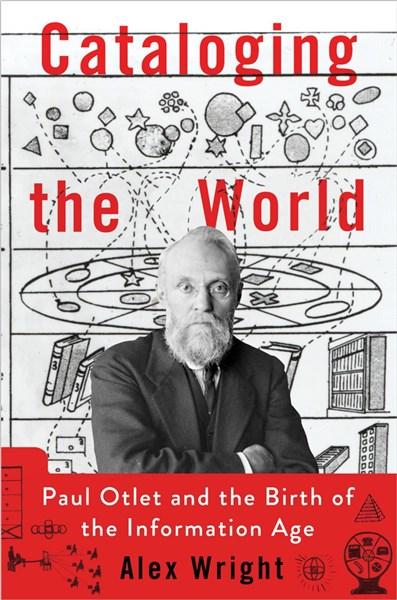
The dream of capturing and organizing knowledge is as old as history.
From the archives of ancient Sumeria and the Library of Alexandria to the Library of Congress and Wikipedia, humanity has wrestled with the problem of harnessing its intellectual output.
The timeless quest for wisdom has been as much about information storage and retrieval as creative genius.
In Cataloging the World, Alex Wright introduces us to a figure who stands out in the long line of thinkers and idealists who devoted themselves to the task.
Beginning in the late nineteenth century, Paul Otlet, a librarian by training, worked at expanding the potential of the catalog card, the world's first information chip.
From there followed universal libraries and museums, connecting his native Belgium to the world by means of a vast intellectual enterprise that attempted to organize and code everything ever published.
Forty years before the first personal computer and fifty years before the first browser, Otlet envisioned a network of 'electric telescopes' that would allow people everywhere to search through books, newspapers, photographs, and recordings, all linked together in what he termed, in 1934, a reseau mondial--essentially, a worldwide web.
Otlet's life achievement was the construction of the Mundaneum--a mechanical collective brain that would house and disseminate everything ever committed to paper.
Filled with analog machines such as telegraphs and sorters, the Mundaneum--what some have called a 'Steampunk version of hypertext'--was the embodiment of Otlet's ambitions.
It was also short-lived.
By the time the Nazis, who were pilfering libraries across Europe to collect information they thought useful, carted away Otlet's collection in 1940, the dream had ended.
Broken, Otlet died in 1944.
Wright's engaging intellectual history gives Otlet his due, restoring him to his proper place in the long continuum of visionaries and pioneers who have struggled to classify knowledge, from H.
Wells and Melvil Dewey to Vannevar Bush, Ted Nelson, Tim Berners-Lee, and Steve Jobs.
Wright shows that in the years since Otlet's death the world has witnessed the emergence of a global network that has proved him right about the possibilities--and the perils--of networked information, and his legacy persists in our digital world today, captured for all time.
Oxford University Press (OUP) este brațul de publicare al Universității din Oxford.
Este una dintre cele mai mari și mai cunoscute edituri academice și educaționale la nivel global.
Iată aspectele cheie ale Oxford University Press: 1.
Editura academică: OUP este renumit pentru publicarea sa academică, producând o gamă largă de lucrări academice, manuale și materiale de referință în diverse discipline.
Acestea includ cărți, reviste și resurse digitale.
Materiale educaționale: Pe lângă publicațiile academice, OUP produce materiale educaționale pentru nivelurile de învățământ primar, secundar și superior.
Acestea includ manuale, resurse digitale de învățare și soluții educaționale.
Prezență globală: OUP are o prezență internațională semnificativă, cu birouri și operațiuni în diferite țări.
Publicațiile sale sunt folosite de educatori, cercetători și studenți din întreaga lume.
Limbi și dicționare: OUP este bine-cunoscut pentru dicționarele sale, inclusiv pentru dicționarul englez Oxford (OED).
Presa este lider în publicarea de referințe lingvistice, producând dicționare și materiale de învățare a limbilor străine.
Reviste: OUP publică o gamă largă de reviste academice care acoperă diverse domenii.
Aceste reviste sunt adesea foarte apreciate în domeniile lor respective.
Resurse digitale și online: OUP a adoptat publicarea digitală și oferă o varietate de resurse online, cărți electronice și platforme digitale pentru a îmbunătăți învățarea și cercetarea.
Amprente specializate: OUP are diverse amprente specializate care se concentrează pe domenii sau piețe specifice, cum ar fi Oxford World's Classics pentru literatura clasică, Oxford Medicine pentru publicații medicale și multe altele.
Filantropie și educație: OUP contribuie la misiunea Universității din Oxford de a promova învățarea și educația.
Profiturile generate de OUP sunt folosite pentru a sprijini eforturile academice ale universității.
Oxford University Press are o istorie bogată care datează din primele zile ale tipăririi.
Este cunoscut pentru angajamentul său față de excelența academică, publicarea de calitate și progresul cunoștințelor.